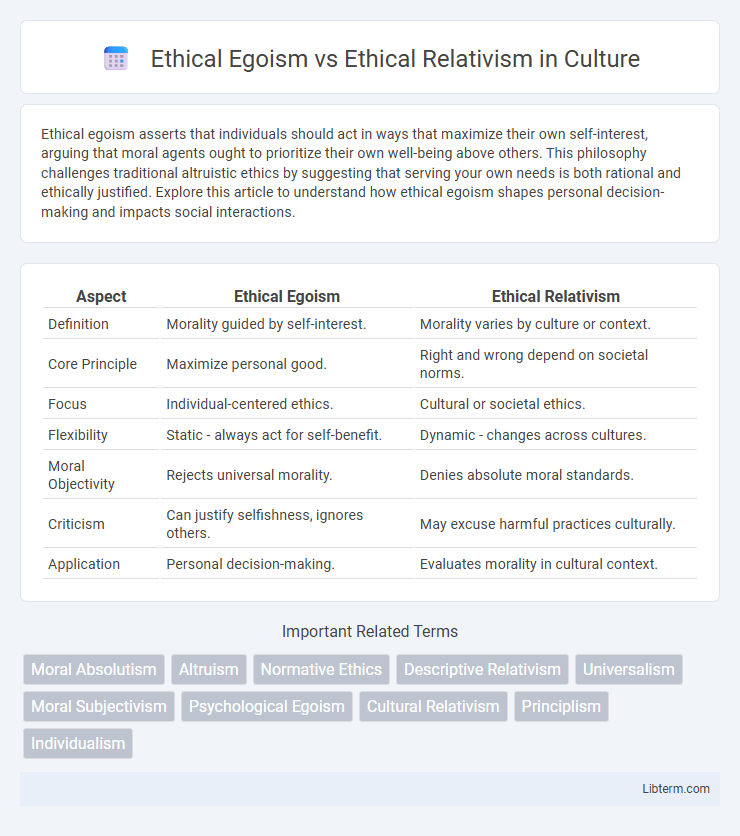Ethical egoism asserts that individuals should act in ways that maximize their own self-interest, arguing that moral agents ought to prioritize their own well-being above others. This philosophy challenges traditional altruistic ethics by suggesting that serving your own needs is both rational and ethically justified. Explore this article to understand how ethical egoism shapes personal decision-making and impacts social interactions.
Table of Comparison
| Aspect | Ethical Egoism | Ethical Relativism |
|---|---|---|
| Definition | Morality guided by self-interest. | Morality varies by culture or context. |
| Core Principle | Maximize personal good. | Right and wrong depend on societal norms. |
| Focus | Individual-centered ethics. | Cultural or societal ethics. |
| Flexibility | Static - always act for self-benefit. | Dynamic - changes across cultures. |
| Moral Objectivity | Rejects universal morality. | Denies absolute moral standards. |
| Criticism | Can justify selfishness, ignores others. | May excuse harmful practices culturally. |
| Application | Personal decision-making. | Evaluates morality in cultural context. |
Introduction to Ethical Egoism and Ethical Relativism
Ethical Egoism asserts that individuals should act in their own self-interest as the foundation of morality, emphasizing personal benefit and long-term well-being. Ethical Relativism maintains that moral principles are not universal but vary based on cultural, societal, or individual contexts, rejecting absolute ethical standards. Both theories challenge traditional moral frameworks by prioritizing individual or cultural perspectives over universal ethical truths.
Defining Ethical Egoism
Ethical Egoism is a normative theory asserting that individuals should act in their own self-interest to achieve moral behavior. It contrasts with Ethical Relativism, which holds that moral standards vary based on cultural or individual perspectives rather than universal principles. Ethical Egoism emphasizes personal benefit as the foundation for ethical decision-making, prioritizing self-regarding actions over external moral frameworks.
Defining Ethical Relativism
Ethical relativism is the philosophical view that moral standards and principles are not absolute but vary according to cultural norms, individual beliefs, or societal contexts. It asserts that what is considered morally right or wrong depends on specific social or cultural frameworks, rejecting universal moral rules. Unlike ethical egoism, which centers on individual self-interest, ethical relativism emphasizes the diversity of moral systems shaped by external circumstances.
Historical Roots and Key Thinkers
Ethical Egoism traces its roots to ancient Greek philosophy, particularly the ideas of Epicurus, who emphasized individual well-being as a guiding principle. Key thinkers like Ayn Rand later formalized Ethical Egoism, advocating rational self-interest as the moral foundation. Ethical Relativism, originating from cultural anthropology and philosophers such as Franz Boas and Ruth Benedict, asserts that moral values are culturally dependent, rejecting universal ethical standards.
Core Principles and Philosophical Foundations
Ethical egoism asserts that individuals should act in their own self-interest as the foundation of morality, emphasizing rational self-benefit and personal well-being. Ethical relativism holds that moral standards are culturally or individually determined, rejecting universal moral truths and basing ethics on societal norms or personal perspectives. Both theories contrast in their philosophical foundations, with egoism grounded in individualism and psychological motivation, while relativism is rooted in cultural context and moral pluralism.
Ethical Egoism in Practice: Real-World Examples
Ethical egoism in practice is exemplified by entrepreneurs who prioritize their own success and wealth while navigating competitive markets, emphasizing self-interest as a guiding principle. Corporate leaders often adopt ethical egoism by making decisions that maximize shareholder value, reflecting the theory's focus on personal and organizational benefit. This approach can be observed in high-stakes negotiations where individuals advocate primarily for their own interests, shaping outcomes based on calculated self-advantage rather than universal moral standards.
Ethical Relativism in Practice: Real-World Applications
Ethical relativism, which asserts that moral standards vary across cultures and contexts, is widely applied in international business to navigate diverse ethical norms without imposing one culture's values on another. In global human rights discussions, ethical relativism challenges universal principles by emphasizing respect for cultural sovereignty and local traditions. This approach encourages tolerance and flexibility but also raises debates about potential moral compromises in cases involving fundamental rights violations.
Strengths and Weaknesses of Ethical Egoism
Ethical Egoism emphasizes individual self-interest as the basis for moral decision-making, promoting personal responsibility and clear guidance for actions, which can enhance motivation and decisiveness. However, its weaknesses include potential conflicts with social harmony and neglect of others' welfare, leading to ethical dilemmas where collective interests are compromised. The theory faces criticism for justifying selfishness and struggling to resolve disagreements when individuals' interests clash, limiting its effectiveness in broader societal contexts.
Strengths and Weaknesses of Ethical Relativism
Ethical relativism emphasizes cultural diversity and promotes tolerance by recognizing that moral values differ across societies, which helps prevent ethnocentrism and allows for a flexible approach to morality. However, its major weakness lies in the inability to critically evaluate harmful practices and the lack of universal moral standards, potentially excusing actions like human rights violations under cultural justifications. This relativistic framework can lead to moral confusion and inconsistency, undermining efforts to establish global ethical norms.
Comparative Analysis: Ethical Egoism vs Ethical Relativism
Ethical egoism asserts that individuals should act in their own self-interest as the foundation of moral decision-making, emphasizing personal advantage and long-term benefits. Ethical relativism maintains that moral judgments are context-dependent, varying across cultures and situations without universal standards. Comparative analysis reveals ethical egoism prioritizes consistent self-benefit across contexts, whereas ethical relativism accepts moral diversity and rejects absolute ethical norms.
Ethical Egoism Infographic

 libterm.com
libterm.com